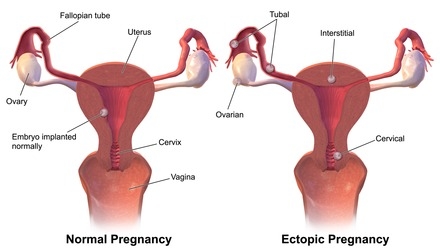
Ectopic Pregnancy
14 Dec 2017 | 4 min Read
Babychakra
Author | 1369 Articles
What is an ectopic pregnancy?
A pregnancy in which the fertilized egg grows outside the uterus (womb) is called as an ectopic pregnancy. Almost all ectopic pregnancies occur in the fallopian tube, which is also known as tubal pregnancy, but in rare cases a pregnancy can also develop at other sites like abdomen, sidewalls of the uterus, etc. As the pregnancy progresses, it can cause the tube to rupture (burst) and lead to major internal bleeding. This can be life threatening for both the mother and baby.
Ectopic pregnancy- symptoms
An ectopic pregnancy presentation varies so much that it is not always straightforward to reach a diagnosis. Each woman is affected differently by an ectopic pregnancy. Some women experience no symptoms, some show a few, while others experience severe visible symptoms. Most women start showing physical symptoms by the sixth week of pregnancy. The symptoms of an ectopic pregnancy include the following:
- Vaginal bleeding: You may experience some spotting or bleeding that is different from your regular periods. It may be lighter or heavier or darker than normal.
- Lower abdominal or pelvic pain: You may experience a sudden and sharp pain without relief, which may also be intermittent. It may occur on only one side of the tummy.
- Pain at the tip of the shoulder: When the fallopian tube ruptures, blood can build up under the diaphragm (the area between your chest and stomach) causing pain that is felt in the shoulder.
- You may even experience weakness, dizziness, or fainting due to blood loss.
Should I seek medical care immediately?
Yes! An ectopic pregnancy can be of serious risk to your health. If you have been experiencing any of the above symptoms, you should seek medical advice immediately. If an ectopic tubal or non-tubal pregnancy has ruptures causing internal bleeding, an emergency surgery is needed to stop the bleeding and prevent further harm to the mother.
Ectopic pregnancy -diagnosis
If your gynecologist suspects that you may have an ectopic pregnancy, he/she will conduct a thorough examination to confirm the diagnosis. An ectopic pregnancy tests includes the following:
- Pelvic examination: Your doctor will perform a vaginal examination to try and feel the baby
- Blood pressure examination: Your blood pressure and pulse will be checked. Bleeding caused by an ectopic pregnancy results in low blood pressure and pulse rate.
- Ultrasonography: An ultrasound scan will be performed to check for early signs of pregnancy and location of the fetus.
- Blood tests: The hormone human chorionic gonadotropin (hCG) is produced in the body when a woman is pregnant. As the pregnancy advances, the level of hCG increases. Unusual rises in the hCG without corresponding symptoms of pregnancy in the mother can point towards an ectopic pregnancy.
What are ectopic pregnancy treatment options?
Remember that an ectopic pregnancy cannot end in successful child birth. Thus, all treatment options aim to terminate the pregnancy in order to reduce the health risks to the mother.
Wait and watch: Sometimes ectopic pregnancies can end on their own, like a miscarriage. Depending on the condition of the patient, the doctor can opt for expectant management where hCG levels are monitored every few days until they are back to normal. This approach is taken only when the pregnancy is in the early stages.
Medical treatment: In certain circumstances, it is treated with medications. A drug (methotrexate) is given as an injection, to prevent the fetus from growing further, which then gradually disappears. Women may need one or two injections depending on the stage of pregnancy.
Ectopic pregnancy surgery: In cases where the fetus has grown or has caused rupture or any other ectopic pregnancy complications, a laparoscopy (key hole surgery) or laparotomy (open surgery) is generally performed.
The treatment options are selected considering the stage of pregnancy and health of the mother. Thus, your healthcare professional will guide you on the best choice of treatment for your case.
Although an ectopic pregnancy experience can be traumatic, remember that the chances of a normal pregnancy the next time are much higher than that of having another ectopic pregnancy. Before planning another pregnancy, give your body some time to heal and wait until you feel emotionally stable to have a healthy pregnancy. This also reduces the chances of another ectopic pregnancy. Remember to seek early medical advice during your next pregnancy.
Disclaimer: The information in the article is not intended or implied to be a substitute for professional medical advice, diagnosis or treatment. Always seek the advice of your doctor.
Also read: Hydramnios: Excess Amniotic Fluid
Read: What is Ectopic Pregnancy in Hindi
Explore the entire collection of articles: Pregnancy Must Know
A


Related Topics for you
Suggestions offered by doctors on BabyChakra are of advisory nature i.e., for educational and informational purposes only. Content posted on, created for, or compiled by BabyChakra is not intended or designed to replace your doctor's independent judgment about any symptom, condition, or the appropriateness or risks of a procedure or treatment for a given person.
